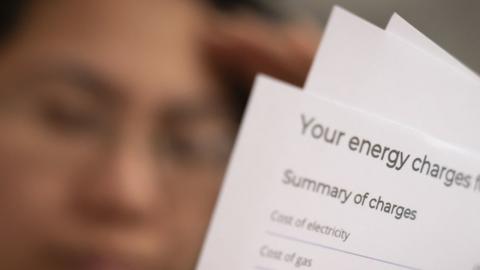Disabled people struggling to pay fuel bills could double
Charities estimate that the number of people with disabilities who are severely struggling to pay energy bills could more than double this year.
At present, about 900,000 people with disabilities are considered to be in fuel poverty, according to Scope and National Energy Action.
If typical domestic bills rise to £3,000 in October, as feared, they said that number could rise to 2.1 million.
The government has said it is supporting people facing rising costs.
Chancellor Rishi Sunak, who delivers his Spring Statement on Wednesday, has pledged to help "where we can make a difference".
The charities said that people with disabilities often had additional energy needs compared to people without disabilities, as many needed to keep heating on for medical reasons, or use electricity to power vital equipment.
"Disabled people are already facing some extremely difficult choices, and this is only going to get worse in the months ahead unless action is taken now," said Mark Hodgkinson, chief executive of Scope, a disability equality charity.
Millions of households are facing a 54% rise in the cost of a typical annual gas and electricity bill, to about £2,000, when the regulator's new, higher price cap takes effect on 1 April.
The war in Ukraine has pushed up wholesale energy costs, leading to worries that the typical household bill could rise to as high as £3,000 in October, when the cap will be adjusted again.
The government has said it is taking "decisive action" in helping people with their bills. This includes a £150 council tax rebate for 80% of households, followed by a £200 discount on bills in October which will need to be repaid.
National Energy Action, which campaigns for warm and dry homes, has called on the chancellor to allow low-income and vulnerable people an exemption from repaying the £200 grant.
Adam Scorer, the charity's chief executive, said: "As heat prices spiral, it is the most vulnerable who suffer the most. A warm, safe home is an absolute necessity for people with disabilities. The impact of a cold home on their mental and their physical health can be catastrophic.
"The current level of support is woefully inadequate. Government must provide greater financial support, or some of the most vulnerable in society will count the cost in more than just pounds and pence."

Energy bills: Rishi Sunak gives one-off repayable £200 discount to households
Re: Energy bills: Rishi Sunak gives one-off repayable £200 discount to households
-

dutchman - Site Admin
- Posts: 57933
- Joined: Fri Oct 23, 2009 12:24 am
- Location: Spon End
Re: Energy bills: Rishi Sunak gives one-off repayable £200 discount to households
Chancellor Rishi Sunak, who delivers his Spring Statement on Wednesday, has pledged to help "where we can make a difference".
He said absolutely nothing and neither did I expect him to!
-

dutchman - Site Admin
- Posts: 57933
- Joined: Fri Oct 23, 2009 12:24 am
- Location: Spon End
Re: Energy bills: Rishi Sunak gives one-off repayable £200 discount to households
Coventry butcher sees 'energy bill double'
A butcher says the family business's energy bill has doubled due to the rising cost of living.
Taylors Butchers in Earlsdon, Coventry, has been trading since 1938 and has recently seen the electricity bill for the shop jump from £1,000 to £2,000 a month, says director Stuart Taylor.
Mr Taylor said food prices had also been "going up steadily for a while".
As a result, he added, the business had raised prices for customers, but would "try not to push prices up too much".
Trade, however, had "stayed stable and normal", as cost-of-living pressures meant "people tend to go out less and spend more on home cooking".
Mr Taylor said beef and lamb had been steadily increasing in price, with chicken going up over the last 10 to 12 days.
He said the hike was due to the increased price of fuel and animal feed, adding the feed came from the UK and Ukraine, with UK sources growing in demand.
Mr Taylor said he hoped for reduced VAT to help businesses weather difficulties.

-

dutchman - Site Admin
- Posts: 57933
- Joined: Fri Oct 23, 2009 12:24 am
- Location: Spon End
Re: Energy bills: Rishi Sunak gives one-off repayable £200 discount to households
I wonder why the city council thinks I'm in need of a £36 *food* voucher and how they think it helps me to pay off my gas bill?
https://www.coventry.gov.uk/hsfvoucher
I very seldom spend more than £20 on food, and alcohol purchases are specifically excluded from the voucher.
Also it's a 'digital' voucher. I don't own a printer and had the devil's own job converting it to a screengrab which could be read at the supermarket checkout.
See also:
https://www.mirror.co.uk/money/househol ... u-25806516
This sounds suspiciously like the American Food Stamps program?
https://www.coventry.gov.uk/hsfvoucher
I very seldom spend more than £20 on food, and alcohol purchases are specifically excluded from the voucher.
Also it's a 'digital' voucher. I don't own a printer and had the devil's own job converting it to a screengrab which could be read at the supermarket checkout.
See also:
https://www.mirror.co.uk/money/househol ... u-25806516
This sounds suspiciously like the American Food Stamps program?
-

dutchman - Site Admin
- Posts: 57933
- Joined: Fri Oct 23, 2009 12:24 am
- Location: Spon End
Re: Energy bills: Rishi Sunak gives one-off repayable £200 discount to households
Dutchman, I'm not eligible, but like you, I struggle to spend £20 on food per week. However, in order to avoid the Tesco small order surcharge, I only order food fortnightly. Could you do something similar here? Maybe stock up on tinned or frozen food?
I also note that the scheme is designed to be used online (QR code etc.). As many in the target group won't be proficient online I think this is out of order. As regards their suggestion that you use trusted family/friends to help, in many cases that is a joke!
2/10 CCC, must try a lot harder.
I also note that the scheme is designed to be used online (QR code etc.). As many in the target group won't be proficient online I think this is out of order. As regards their suggestion that you use trusted family/friends to help, in many cases that is a joke!
2/10 CCC, must try a lot harder.
Of course it'll fit; you just need a bigger hammer.
-

rebbonk - Posts: 72634
- Joined: Thu Nov 12, 2009 6:01 am
Re: Energy bills: Rishi Sunak gives one-off repayable £200 discount to households
I believe the voucher can be used for more than one shopping trip? I certainly hope so as there's no way I could carry that amount of food home in one go.
Update: I purchased £26 worth of food and beer which was as much as I could carry. Had difficulty paying for it all with a screenshot of the voucher and Morrisons tell me I still have £10 credit left on the voucher.
I wouldn't like to have to pay that way every time though but I have a feeling we will be forced to at some time in the near future.
Update: I purchased £26 worth of food and beer which was as much as I could carry. Had difficulty paying for it all with a screenshot of the voucher and Morrisons tell me I still have £10 credit left on the voucher.

I wouldn't like to have to pay that way every time though but I have a feeling we will be forced to at some time in the near future.
-

dutchman - Site Admin
- Posts: 57933
- Joined: Fri Oct 23, 2009 12:24 am
- Location: Spon End
Re: Energy bills: Rishi Sunak gives one-off repayable £200 discount to households
So most energy supplier websites have crashed today. Coincidence? Call me cynical... 


Of course it'll fit; you just need a bigger hammer.
-

rebbonk - Posts: 72634
- Joined: Thu Nov 12, 2009 6:01 am
Re: Energy bills: Rishi Sunak gives one-off repayable £200 discount to households
I just submitted my reading by phone without any problem. 
Call 0333 202 9802, select option 1 and say “Meter Reading”, then follow the instructions.
Call 0333 202 9802, select option 1 and say “Meter Reading”, then follow the instructions.
-

dutchman - Site Admin
- Posts: 57933
- Joined: Fri Oct 23, 2009 12:24 am
- Location: Spon End
Who is online
Users browsing this forum: No registered users and 9 guests
-
- Ads


